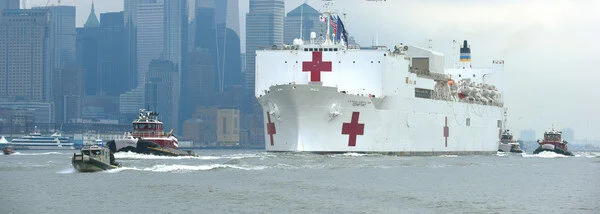EDITORIAL: Humans Are Not the Virus
The views expressed herein represent the views of a majority of the members of the Caravel’s Editorial Board and are not reflective of the position of any individual member, the newsroom staff, or Georgetown University.
The USNS Comfort, a U.S. military hospital ship, is now stationed in New York Harbor to help relieve strain on hospitals in the virus-ravaged city. (U.S. Northern Command)
“We were the virus all along.”
No. We are not a “virus” on the planet. We never have been, and subscribing to this line of thought is dangerous and reckless.
Social media has been flooded in the past weeks with posts adhering to this theme. Usually, they refer to recent environmental developments in countries under quarantine and lockdown resulting from the suspension of business-as-usual. They bring up the dolphins in Venice (a false story, by the way; while canals in Venice have cleared and residents have spotted fish, the common pictures of dolphins and swans were actually taken in other locations) or clearer skies and decreased pollution in China and other countries.
Here's an unexpected side effect of the pandemic - the water's flowing through the canals of Venice is clear for the first time in forever. The fish are visible, the swans returned. pic.twitter.com/2egMGhJs7f
— Kaveri 🇮🇳 (@ikaveri) March 16, 2020
While it is true that the various responses to COVID-19 have resulted in temporary and entirely incidental positive effects on the environment, misdiagnosing “humans” as the problem buys into a quasi-ecofascist line of thought that inevitably leads to eugenics and ethnonationalism.
Ecofascism & Ethnonationalism
Ecofascism advocates tackling climate change through fascist action: eugenics aimed at ethnic, racial, and other minorities. Posts calling humans the “virus,” while not explicitly ecofascist, subscribe to a near-identical style of thinking by framing individual humans as dangerous, threatening, and worthy of extermination (as one would do to a virus). Ecofascism frames humans as obstacles to successful environmental recovery and protection and allows for, by extending that line of thought, advocacy for dramatically limiting the number of humans on the planet.
Tributes left behind for the victims of a Mosque shooting in Christchurch, New Zealand, in 2019, the perpetrator of which espoused ecofascist views. (Wikimedia Commons)
Using such language, whether jokingly or not, feeds into a narrative appropriated and dominated by ethnonationalists and ecofascists that advocate eugenics to eliminate minorities. The two are practically inseparable in modern ecofascist thought. In fact, both the El Paso, Texas, shooter and the Christchurch, New Zealand, shooter, who collectively killed 73 people, referenced explicitly ecofascist ideology in their manifestos. Both explicitly tied ethnonationalism to environmentalism and argued for the “removal” of massive numbers of people (read: non-white, non-Christian people) to protect their “way of life” and the environment. Ecofascism not only represents a dangerous and appalling view of environmentalism, but it also falsely frames it as a problem where humans are the issue.
Capitalism on Pause
The skies are not clearer and the rivers are not cleaner because humans are out of the picture or because we are dying from COVID-19, as many of these posts tragically imply. The environment is improving because, by instituting quarantines and lockdowns, countries around the world are effectively shutting down their economies and by implication, suspending capitalism. The temporary halt to capitalism provoked by shelter-in-place orders and the suspension of all but the most essential services is the underlying reason for the noted environmental improvement of the past few weeks. We have stopped, as a global society, producing, consuming, and polluting as much as we did and would have done without the spread of COVID-19.
The System—Not Humanity—Is the Problem
Witty posts comparing humanity to COVID-19 utterly miss this critical connection between the environment and our economic system. The economy we took pride in—before COVID-19 laid it to waste—is the same one responsible for the climate change specter that haunts our collective imaginations. The hopeful still believe that we can continue exactly as is. Unfortunately, that is simply not true: three major studies concluded that we cannot continue to grow our GDPs, one of the main goals of capitalism, without drastically increasing resource use.
High taxes, cap-and-trade, and innovation funding not only perpetuate the capitalist system in the name of conservation, but none seem likely to succeed at lowering our resource use to acceptable levels. Realistically, any solution requires hard caps on resource use.
That’s not as hard as it sounds. We need to stop consuming as much, stop producing wastefully, and start phasing out industries that do not matter. The world has enough resources for everyone to share. We just need to distribute them better, both for our planet and for those capitalism leaves at the bottom.
We humans are not the virus, and it would be a mistake to devalue each other as such. But, we do collectively choose to participate in an economic system bent on improving profit margins even if it means starving and exploiting the global poor, our soils, and our oceans. By involving us in a system that does just that, capitalism is the virus. Not us.
Representative Alexandria Ocasio-Cortez unveils the Green New Deal, a set of expansive environmental policy reforms. (Wikimedia Commons)
After the pandemic, we will see efforts to improve global public health, to change our institutions to promote pandemic readiness and information-sharing, perhaps even efforts to reform pharmaceutical and hospital practices to best set up society to fight the next pandemic. But, most of these efforts probably will not change the capitalist structure of our economy. We must focus on global public health after this crisis, but we cannot leave climate change and its required economic reforms behind to do that.
In fact, we need to start thinking about how to do that now. Pollution levels actually rebound after economic collapses: governments will push dirty construction and industrial production past pre-crisis levels in their efforts to restart the economy. Our climate may be set on a worse trajectory after the pandemic than before, which makes it more important than ever for governments to consider green stimulus packages.
Meaningful & Creative Structural Reform
The way forward is through meaningful and creative structural reform that will require engagement on a much deeper and more critical level than offhand comments on Twitter. We have to reexamine how we operate and reexamine the economic structures we use. We cannot fall prey to defeatist attitudes that assume the only path forward is by somehow fixing humans as the problem (whether by ascribing humanity itself as literal the cause of climate change or believing the only path forward is by radically decreasing our numbers).
Eugenics is never a valid solution to any problem, and that includes environmental degradation and climate change. (Wikimedia Commons)
The issue of climate change stems from the systems we use, systems that certainly have their merits. Instead of calling defeat on humankind, we need to structurally reform the systems we use to make them sustainable. That is a balance we can achieve, and it is one that we know we can achieve (experts have told us that repeatedly and for years). We cannot afford to not act. But, we also cannot afford to lose our humanity in the process of acting, to subscribe to or enable genocidal and racist strains of thought. We are not the virus. We have never been, and we never will be. The fault is neither in our stars nor in ourselves but in the systems we have created—and which we can fix.
Have a different opinion? Write a letter to the editor and submit it via this form to be considered for publication on our website!




